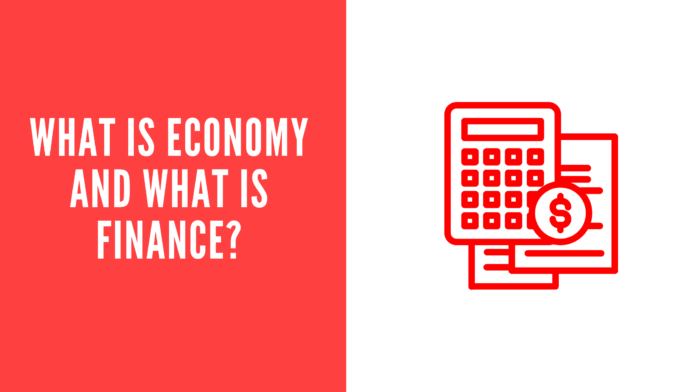What is Economy?
Economy refers to the system of production, distribution, and consumption of goods and services within a geographic region, such as a country or a group of countries. It encompasses all economic activities and transactions conducted by individuals, businesses, and governments.
The economy is a complex network of interactions between various factors, including:
- Production: The process of creating goods and services using factors of production such as land, labor, capital, and entrepreneurship. This includes activities such as manufacturing, agriculture, construction, and services.
- Consumption: The utilization of goods and services by individuals, households, businesses, and governments to satisfy their needs and wants. Consumption drives demand for goods and services in the economy.
- Distribution: The allocation and exchange of goods and services among producers, consumers, and intermediaries through markets, trade, and distribution channels.
- Employment and Labor: The participation of individuals in the workforce, including employment, unemployment, labor force participation rates, wages, and working conditions.
- Investment: The allocation of resources for the creation of capital assets, such as factories, infrastructure, technology, and human capital, to enhance productivity and future economic growth.
- Trade and Commerce: The exchange of goods, services, and capital across borders through international trade, investment, and financial transactions.
- Government Policies and Regulations: The role of governments in shaping economic activity through fiscal policies (taxation, spending, borrowing) and monetary policies (interest rates, money supply) to achieve economic objectives such as price stability, full employment, and sustainable growth.
Economists study the economy to understand its overall performance, trends, and drivers, as well as to formulate policies aimed at promoting sustainable economic growth, stability, and prosperity. Key indicators used to assess the economy’s health include gross domestic product (GDP), unemployment rate, inflation rate, trade balance, consumer confidence, and business sentiment.
Overall, the economy plays a central role in shaping the standard of living, employment opportunities, income distribution, and overall well-being of individuals and societies.
What is Finance?
Finance refers to the management of money, assets, and liabilities, as well as the allocation of resources within an economy or organization. It encompasses a wide range of activities, institutions, and practices related to the acquisition, utilization, and management of financial resources.
Key aspects of finance include:
- Financial Management: Financial management involves the planning, organizing, directing, and controlling of financial activities within an organization. It includes budgeting, financial reporting, cash flow management, and strategic financial decision-making to achieve the organization’s goals and objectives.
- Investment: Investment refers to the allocation of funds into assets, such as stocks, bonds, real estate, and commodities, with the expectation of generating returns or capital appreciation over time. Investors assess various factors, including risk, return potential, liquidity, and diversification, to make informed investment decisions.
- Financial Markets: Financial markets are platforms where buyers and sellers trade financial assets, such as stocks, bonds, currencies, and derivatives. They facilitate the efficient allocation of capital and risk sharing among market participants. Examples of financial markets include stock exchanges, bond markets, foreign exchange markets, and commodity markets.
- Financial Institutions: Financial institutions, such as banks, credit unions, insurance companies, investment firms, and brokerage firms, play crucial roles in the financial system by providing financial services, intermediating funds between savers and borrowers, and managing financial risks.
- Corporate Finance: Corporate finance focuses on the financial management of corporations, including capital budgeting, capital structure decisions, dividend policy, and corporate governance. It aims to maximize shareholder value and optimize the use of financial resources within the firm.
- Personal Finance: Personal finance involves managing individual or household finances, including budgeting, saving, investing, and retirement planning. It aims to achieve financial goals such as wealth accumulation, debt management, and financial security over the long term.
- Financial Planning: Financial planning involves setting financial goals, assessing financial resources and obligations, creating a financial roadmap, and implementing strategies to achieve financial objectives. It covers areas such as retirement planning, tax planning, estate planning, and risk management.
Overall, finance plays a critical role in the functioning of the economy by facilitating the efficient allocation of resources, promoting economic growth and development, and enabling individuals and organizations to achieve their financial goals and objectives.
Differences
“Economy” and “finance” are related concepts, but they refer to different aspects of the broader financial system and economic activity:
- Economy:
- The economy refers to the system of production, distribution, and consumption of goods and services within a geographic region, such as a country or a group of countries.
- It encompasses all economic activities, including production, employment, consumption, investment, trade, and government policies that influence these activities.
- The economy is often measured and analyzed using various macroeconomic indicators, such as gross domestic product (GDP), unemployment rate, inflation rate, and trade balance.
- Economists study the economy to understand its overall performance, trends, and drivers, as well as to formulate policies aimed at promoting sustainable economic growth, stability, and prosperity.
- Finance:
- Finance, on the other hand, focuses on the management of money, assets, and liabilities, as well as the allocation of resources within the economy.
- It involves activities such as banking, investing, lending, borrowing, budgeting, risk management, and financial planning, both at the individual and institutional levels.
- Finance encompasses various financial markets, institutions, instruments, and practices, including stocks, bonds, derivatives, banking services, insurance, and wealth management.
- Financial professionals, such as bankers, financial analysts, portfolio managers, and financial advisors, play key roles in the finance sector by providing financial services, advice, and expertise to individuals, businesses, and governments.
In summary, while the economy refers to the overall system of production, distribution, and consumption of goods and services within a region, finance deals with the management of money, assets, and liabilities within that economic system. Economy focuses on the broader picture of economic activity and performance, while finance focuses on the specific mechanisms and instruments that drive financial transactions and resource allocation within the economy.

